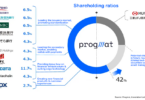Professional services provider Ernst & Young (EY)’s Japanese branch plans to launch a blockchain traceability solution for the alcoholic beverage sake, reported Nikkei.
The SAKE Blockchain will enable buyers to view provenance details of the drink and allow brewers to differentiate their product from counterfeits.
Sake is a traditional Japanese alcoholic drink made from fermented rice. Much like wine, sake has several flavors which is affected by the water used. Using blockchain’s transparency, Japanese sake producers may get a better price for their product.
The SAKE Blockchain will record the ingredients, brewing method, and quality control measures for distribution, such as monitoring temperature. Additionally, the consumer can scan a QR code on the sake bottle to check details about the brewer and get recommendations on foods to pair with the drink.
In 2018, sake sales around the globe ex-Japan totaled a record ¥22.2 billion ($201 million). Of this, nearly 30% of all shipments were to the United States. The drink is rising in popularity, but few sake producers have extensive distribution chains to monitor their product until it reaches the end consumer.
This has given rise to the problem of counterfeit sake, which is commonly sold in Asia, sometimes at a premium to the original Japanese sake.
“Being able to tell the story of the production and origin (of sake) will help to differentiate it from fake products,” Hideaki Kajiura, partner at EY Advisory & Consulting told Nikkei.
Kajiura added that a blockchain platform would increase sake consumption outside Japan, and also boost brewery tourism in the country.
The blockchain solution will soon be rolled out in Hong Kong and Singapore. EY Japan plans to expand the blockchain solution for track and trace in the country’s fruit industry, which has some premium products costing as high as $200.
EY has developed the Ops Chain blockchain, a customized version of Ethereum. It has both private consortium versions of the solution as well as a public edition which uses Zero-Knowledge Proofs for privacy. It recently released the third generation of zero-knowledge proof (ZKP) blockchain for public network on Ethereum.
The consultants have already used the Ops Chain on another alcohol traceability solution, this time for the TATTOO wine marketplace.
A few months ago, Ledger Insights reported on EY’s launch of a blockchain solution for managing public funds by government agencies. Among other projects, EY and Microsoft have developed a solution for managing content rights and royalties for gaming. Additionally, It was one of the many recipients of a $49 million blockchain contract from the U.S. Department of Health and Human Services.
Developed jointly with Guardtime, EY also has a blockchain marine insurance platform called InsurWave, with Maersk as the first client.






